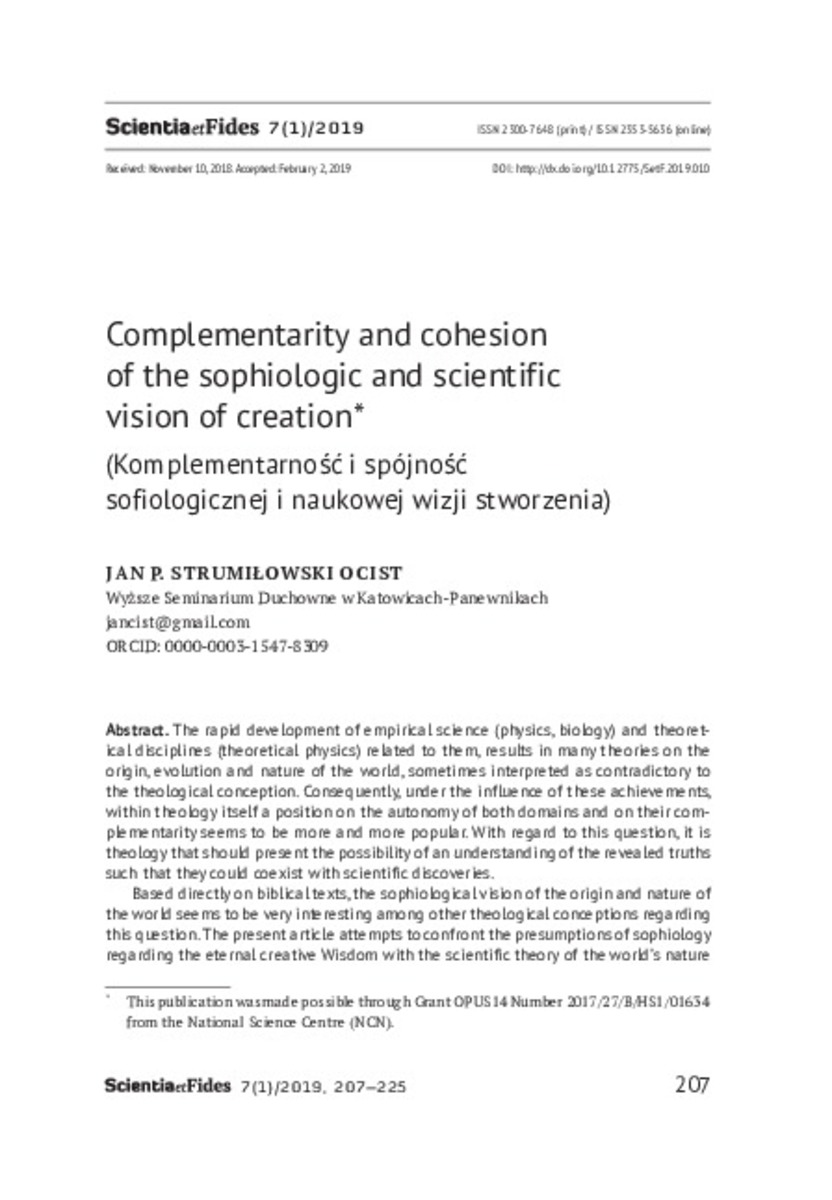Full metadata record
| DC Field | Value | Language |
|---|---|---|
| dc.creator | Strumilowski, J.P. (Jan P.) | - |
| dc.date.accessioned | 2019-10-18T07:02:25Z | - |
| dc.date.available | 2019-10-18T07:02:25Z | - |
| dc.date.issued | 2019 | - |
| dc.identifier.citation | Strumilowski, J.P. (Jan P.) | es |
| dc.identifier.uri | https://hdl.handle.net/10171/58318 | - |
| dc.description.abstract | The rapid development of empirical science (physics, biology) and theoretical disciplines (theoretical physics) related to them, results in many theories on the origin, evolution and nature of the world, sometimes interpreted as contradictory to the theological conception. Consequently, under the influence of these achievements, within theology itself a position on the autonomy of both domains and on their complementarity seems to be more and more popular. With regard to this question, it is theology that should present the possibility of an understanding of the revealed truths such that they could coexist with scientific discoveries. Based directly on biblical texts, the sophiological vision of the origin and nature of the world seems to be very interesting among other theological conceptions regarding this question. The present article attempts to confront the presumptions of sophiology regarding the eternal creative Wisdom with the scientific theory of the world’s nature (i.e. its laws), its development (evolution, accidentality of events) and on human existence (e.g. liberty) in order to demonstrate the possibility of the coexistence of these discourses without contradiction. | es_ES |
| dc.description.abstract | Bardzo szybki rozwój nauk empirycznych (fizyka, biologia), oraz związanych z nimi dziedzin teoretycznych (fizyka teoretyczna) prowadzi do powstawania teorii dotykających zagadnień początku, rozwoju i natury świata, które bywają interpretowane jako opozycyjne w stosunku do koncepcji teologicznych. Z kolei na gruncie samej teologii, pod wpływem tychże odkryć, coraz popularniejsze wydaje się być stanowisko opowiadające się za uznaniem autonomii obu dziedzin oraz ich komplementarności. W obliczu tak rozumianej zależności po stronie teologii leży obowiązek zdania sprawy z możliwości takiego rozumienia prawd objawionych, by mogły one współistnieć z odkryciami naukowymi. Wśród różnych koncepcji teologicznych dotykających zagadnienia genezy i obrazu świata ciekawe ujęcie prezentuje wywodząca się wprost z tekstów biblijnych wizja sofiologiczna. Niniejszy artykuł dokonuje konfrontacji założeń sofiologii na temat odwiecznej Mądrości stwórczej, z tezami naukowymi w odniesieniu do kształtu świata (praw nim rządzących), jego rozwoju (ewolucji, przypadkowości zdarzeń), oraz istnienia człowieka dotykającego problemu ludzkiej wolności, w celu ukazania możliwości współistnienia tych dyskursów, bez popadania w sprzeczność. | es_ES |
| dc.language.iso | eng | es_ES |
| dc.rights | info:eu-repo/semantics/openAccess | es_ES |
| dc.subject | Sophiology | es_ES |
| dc.subject | Wisdom | es_ES |
| dc.subject | creation | es_ES |
| dc.subject | Trinitarian ontology | es_ES |
| dc.subject | cosmology | es_ES |
| dc.subject | evolution | es_ES |
| dc.subject | science and religion | es_ES |
| dc.subject | sofiologia | es_ES |
| dc.subject | Mądrość | es_ES |
| dc.subject | stworzenie | es_ES |
| dc.subject | ontologia trynitarna | es_ES |
| dc.subject | kosmologia | es_ES |
| dc.subject | ewolucja | es_ES |
| dc.subject | nauka i religia | es_ES |
| dc.title | Complementarity and cohesion of the sophiologic and scientific vision of creation | es_ES |
| dc.title.alternative | Komplementarność i spójność sofiologicznej i naukowej wizji stworzenia | es_ES |
| dc.type | info:eu-repo/semantics/article | es_ES |
| dadun.citation.endingPage | 225 | es_ES |
| dadun.citation.number | 1 | es_ES |
| dadun.citation.publicationName | Scientia et Fides | es_ES |
| dadun.citation.startingPage | 207 | es_ES |
| dadun.citation.volume | 7 | es_ES |
Files in This Item:
Statistics and impact
Items in Dadun are protected by copyright, with all rights reserved, unless otherwise indicated.






